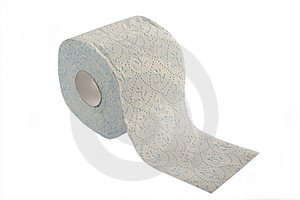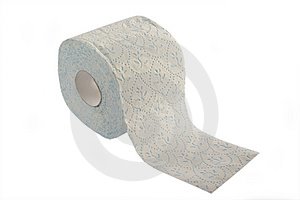
Now I know The Thin Green Line should be writing about more serious things, things like Obama's stimulus package and the green initiatives it contains.
And we'll get to it, we promise. Our army of financial analysts is going over the figures as you read this.
But in the meantime, let's face it; sometimes, you just can't resist the low-hanging fruit and by that I mean a story about toilet paper.
Infantile? Yes.
Sophomoric? You bet.
But we here at The Thin Green Line have the raw guts to stand up and say what needs to be said about soft and puffy toilet paper. It stinks! (And we mean before you use it, not after, although, well, it stinks then too.)
Hey, take it easy, don't get your knickers in a twist, even the staid grey lady,
The New York Times, had fun with this article. After all, some newsroom jokester succumbed to temptation as well and put Mr. Whipple in the headline. We would never sink so low.
All joking aside, this is a pretty sad commentary on us, that a nation that likes to brag its people are the toughest on the global block, is populated with such pampered milksops that we need ultra soft TP to clean our bums.
Here's the straight poop, toilet paper, more than anything else, can most easily be made from recycled paper. In Europe, this kind of TP makes up 20 percent of the market, although it should be more at least they're trying people.
Here in the U.S.? That percentage of the market is a paltry 2 percent. That's pathetic folks and makes us flush with indignation.
The reason this is important is it takes trees to make TP soft. "Millions of trees harvested in North America and in Latin American countries, including some percentage of trees from rare old-growth forests in Canada," just for a few moments passing comfort for our sensitive nether regions.
Americans use an average of 23.6 rolls per capita a year, that's 23 opportunities a year to help create a market for all that paper we're starting to recycle. And folks, those jobs will stay here in the U.S.
According to the Times, "25 percent to 50 percent of the pulp used to make toilet paper in this country comes from tree farms in South America and the United States. The rest, environmental groups say, comes mostly from old, second-growth forests that serve as important absorbers of carbon dioxide, the main heat-trapping gas linked to
global warming. In addition, some of the pulp comes from the last virgin North American forests."
Do we really want to destroy something so valuable, and trash our planet for something so trivial? Talk about not giving a crap!
Marcal, a brand easily found on the shelves of your local grocer, makes all its TP from recycled fiber, although it doesn't make as much noise about it as it probably should.
And if you're really hung up on having "premium" toilet paper, you can always buy some from places like Seventh Generation that charge more.
But there's hope in despair. As the economy tanks, sales of "premium" toilet paper are down.
And let's think about that phrase for a moment people. "Premium toilet paper" should be considered a premium oxymoron.
Why in the world do we need something to be "premium" when we immediately flush it down the toilet never to be used (or enjoyed) again? Doing so, in my opinion, makes someone a real ass.
OK, we're done with the puns now.
Sorry to be so cheeky.
Ooops, OK, now we're really done.
Labels: Marcal, Seventh Generation, The New York Times, toilet paper


